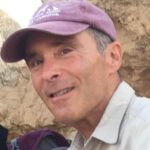The Pedagogy of Loving Goodness first considers the tension in the commandment between loving your neighbor and loving yourself. The imperative to love the other seems to depend upon our capacity to love ourselves. The productive tension between love and self and love of the other is the core of this pedagogy.
January 2023
Loving Goodness: A Pedagogy through Individuality and Belonging
The pedagogy of Loving Goodness explores the tension between self-love and the love of the other
Charles founded the Nesiya Institute in 1985 with the goal of inspiring North American and Israeli young people from diverse backgrounds to invigorate Jewish life – for themselves and others. He served as Nesiya’s Executive Director from its inception in 1985 through 2012. Since then he has been studying various forms of alternative medicine and healing, provided Personal Growth Counseling for individuals and couples, and worked also as a consultant and teacher of Jewish texts and experiential learning. Charles is currently working on a screenplay called “Symptoms” and other writing. He earned his B.A. degree with Honors in Comparative Literature from Brown University, where he was awarded first prize of the undergraduate poetry award. He also studied in Jerusalem at the Hebrew University and the Pardes Institute. He earned a Master of Education degree from Harvard University in Counseling and Consulting Psychology. Charles has also worked with delinquent boys in New York City, as a photographer in Bali, and as a Jewish educator at the Cleveland JCC and the Board of Jewish Education in Chicago. Charles lives in Jerusalem near his 5 grandchildren.
Share
More PEDAGOGIES RESOURCES
A Pedagogy of the 48: Connecting Pirkei Avot, LIfe, and Learning
Dr. Gila Silverman
Director of Jewish Lifelong Learning
Siegel Lifelong Learning, Case Western Reserve University
This pedagogy invites participants to consider how the 48 different ways of “acquiring Torah” resonates with them
Access ResourceL’Shem Yichud: A Pedagogy For the Sake of Integration
Rabbi Jesse Paikin
Executive Director, Base
L’shem Yichud: For the Sake of Integration is a pedagogy based on an ancient practice of intention setting.
Access ResourceMachloket-i: A Personal, Professional Development Program
Edward Magiste
Educator
The Temple Tifereth Israel
Designed as a professional development strategy, this pedagogy of Machloket targets veteran educators asking to develop their teaching and ideas
Access ResourceThe Pedagogy of Argument
Robbie Gringras
Co-Founder and Co-Director
For the Sake of Argument
The Pedagogy of Argument seeks to develop learners who are passionate about debates
Access ResourcePedagogy of Kinyan Torah: Helping Students Develop Their Own Interpretations of Torah
Ilana Gleicher Bloom
Founder of Mensch Academy at Mishkan Chicago,
Doctoral Candidate in Jewish Education, Coordinator of Pardes Experiential Educators Program
The pedagogy of Kinyan Torah helps educators support all learners to find their own unique Torah within themselves.
Access ResourceInsourcing, Reflection, and the “Long, Short Path”
Chanie Chein
Co-Founder and Director
Chabad at Brandeis and M54
The pedagogy of reflection focuses on acquiring the language and tools to learn from existing experiences, habits and choices, at appropriate life stages
Access Resource